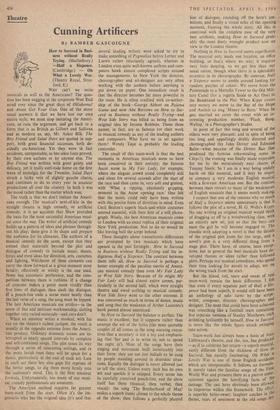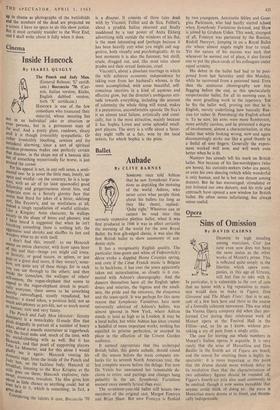Theatre
Cunning Artificers
By BAMBER GASCOIGNE How to Succeed in Busi- ness without Really Trying. (Shaftesbury.) —Half a Sixpence. (Cambridge.) — Oh What a Lovely War.
)JJ 17 (Theatre Royal, Strat- ford, E.) WHY can't we write musicals as well as the Americans? The ques- tion has been nagging at the corporate West End mind ever since the great days of Oklahoma! and Annie Get Your Gun. One of the more usual answers is that we have lost our own native style; we must stop imitating the Ameri- cans, so runs the argument, and get back to a form that is as British as Gilbert and Sullivan and as modern as, say, Mr. Acker Bilk. The Boy Friend and Salad Days are quoted in sup- port, both great financial successes, both de- cidedly un-American. Yet they were in fact accidents, unrepeatable, as has since been proved, by their own authors or by anyone else. The Boy Friend was written with great gaiety and delicacy, yet it really surf-rode home on the first wave of nostalgia for the Twenties. Salad Days struck a lucky vein of slightly gauche charm, and continues to do so every year in amateur productions all over the country. In both it was the mood rather than the matter which won.
The truth is that we don't imitate the Ameri- cans enough. The musical's next-of-kin in the straight theatre is high comedy, or artificial comedy; it is no accident that Shaw provided the basis for the most successful American musi- cal since the war. The writer of artificial comedy builds up a pattern of ideas and phrases through- out his play; these give it its shape and prepare the audience for its climaxes. The authors of a musical comedy do the same, except that they extend their materials beyond the plot and dialogue of comedy to include music, dance, lyrics and even ideas for direction, sets, costumes and lighting. Whichever of these elements can carry the show forward at a given moment most briskly, effectively or wittily is the one used. None has automatic preference, and the com- petition between them is ruthless. If a change of costume makes a point more vividly than five lines of dialogue, then slash the dialogue. If a punch-line ends a scene more neatly than the last verse of a song, the song must be lopped. The best American musicals use artifice—in the sense of fine and intricate workmanship, slotting together very varied materials—and ours don't.
When an amateur writes a musical, with his eye on the theatre's richest jackpot, the result is usually at the opposite extreme from the Ameri- can product. Ordinary dramatic scenes are in- terrupted at neatly spaced intervals by complete and self-contained songs. The plot noses its way through a series of interesting settings, and in the more lavish ones there will be space for a dance, particularly at the end of each act. Late in each act there are also gaps for reprises of the better songs, to dig them more firmly into the audience's mind. This is the firm amateur formula. Unfortunately, too many of our musi- cal comedy professionals are amateurs.
The American method requires far greater team-work from the start. Often it's the im- presario who has the original idea (it's said that
several leading writers were asked to try to make something of Pygmalion before Lerner and Loewe rather reluctantly agreed), whereas in London even quite well-known authors and com- posers hawk almost completed scripts around the managements. In New York the director, choreographer and set-designer are very often working with the authors before anything is put down on paper. One immediate result is that the director becomes far more powerful in the team. He is often credited with co-author- ship of the book—George Abbott on Pajama Game and now Abe Burrows on How to Suc- ceed in Business without Really Trying—and West Side Story was billed as being from an original idea by Jerome Robbins. Those three names, in fact, are as famous for their work in musical comedy as any of the leading authors and composers. Who have we to set against them? Wendy Toye is probably the leading contender.
The result of this team-work is that the best moments in American musicals seem to have been conceived in their entirety; the famous Ascot scene in My Fair Lady, for example, where the elegant crowd stood completely still and silent for several seconds after the start of the race and then came in, very soft and genteel, with 'What a ripping, absolutely gripping, moment in the Ascot opening race.' One felt that the music could only have been written with this precise form of direction in mind. Even Cecil Beaton's superb black-and-white costumes seemed essential, with their hint of a still photo- graph. Wisely, the best American musicals come to London with an exact replica of their original New York production. Not to do so would be like leaving half the script behind.
These thoughts about transatlantic differences are prompted by two musicals which have opened in the past fortnight: How to Succeed in Business without Really Trying and the in- digenous Half a Sixpence. The contrast between them tells all. How to Succeed is perhaps a better example of the peculiar merits of Ameri- can musical comedy than even My Fair Lady or West Side Story. Because of its origin My Fair Lady still had almost entire scenes, par- ticularly in the second half, which were straight theatre and owed nothing to musical comedy. West Side Story went to the other extreme. It was conceived so much in terms of dance, music and song that the weakness of Arthcr Laurents's book passed almost unnoticed.
In How to Succeed the balance is perfect. The music is excellent, but it supports rather than swamps the wit of the lyrics (the most quotable couplet of all comes in the song warning execu- tives that a secretary is not a toy and emphasis- ing that 'her pad is to write in, not to spend the night in'). Most of the songs have their staging and movement built inextricably into their form; they are not just ballads to be sung by people standing around in dramatic situa- tions. Equally the dialogue is never allowed just to tell the story. Unless every inch has its own wit and sparkle it is snipped. Every scene has its carefully contrived punch-line, and the show itself has three (musical, then verbal, then visual): the song 'The Brotherhood of Man' makes a superb ironic climax to the whole theme of the show; then follows a perfectly planted line of dialogue, rounding off the hero's am- bitions; and finally a visual echo of the opening
moment, framing the whole story. All this is contrived with the complete ease of the very best artificers, making flow to Succeed prob- ably the most finely wrought product now on view in the London theatre.
Nothing in How to Succeed seems superfluous.
The material only needs one location, an office building, so that's where we stay; it requires very little dancing, so we get less than our usual ration, though what there is is splendidly eccentric in its choreography. By contrast, Half a Sixpence seems to amble around looking for random patches of colour. We move from the Promenade to a Martello Tower to the Old Mili- tary Canal (for a regatta finale to Act One) to the Bandstand to the Pier. When Kipps comes into money we move to the Bar of the Hope
and Anchor to sing 'Money to Burn.' When be gets married we cover the event with an in- teresting production number, 'Flash, Bang, Wallop.' in a Photographer's Studio.
In point of fact this song and several of the others were very pleasant; and in spite of being too long and appallingly drably directed and choreographed (by John Dexter and Edmund Balin—what became of the Dexter flair that produced the famous coke-stealing scene in Chips?), the evening was finally made enjoyable for me by the miraculously easy charm of Tommy Steele. So I am in a way being undulY harsh on this material, and it may be unjust to compare a very moderate English musical with a first-rate American one. But the contrast between them reveals so many of the weaknesses of English musicals that it seems worth making. I suspect that one of the reasons why so much of Half a Sixpence seems unnecessary is that it follows the plot of a novel, H. G. Wells's Kipps. No one writing an original musical would think of dragging us off to a woodworking class, with an entirely new set, just so that the hero can meet the girl he will become engaged to. The trouble with adapting a novel is that the details
of the original plot loom far too large, and a novel's plot is a very different thing from a stage plot. There have, of course, been excep-
tions, but in general the best musicals have de- veloped themes or ideas rather than followed plots. Perhaps our musical comedians, who spend their time looking for novels to adapt, are on the wrong track from the start.
But the blood, toil, tears and sweat of real team-work remain the basic difference. I felt that even if every separate part of Half a pence had been superb, it would still have beet' an anthology of solo turns by the script- writer, composer, director, choreographer and designer. The most that could have been achieved
was something like a football team containing five separate versions of Stanley Matthews, eaCti dribbling brilliantly by himself. How to Succeed is more like the whole Spurs attack swinging into action.
Team-work has always been a basis of Joal Litticwood's theatre, and she, too, has produceu —as if to celebrate her return--a superb musical. vastly different from the slickness of How Succeed, but equally fascinating. Oli What a Lovely War is one of those English accidentg which are unrepeatable. It follows no formula. It merely takes the familiar songs of the First World War and presents them as a pierrot enter- tainment against the horrifying facts of the carnage. The cast have obviously been allowed to improvise within this framework. The effect is superbly bitter-sweet; laughter catches in th° throat, tears of sentiment at the old songs drY UP in shame as photographs of the battlefields and the numbers of the dead are projected on a screen. I have no space to do this show justice. 13ut it must certainly transfer to the West End, and I shall write about it fully when it does.



































 Previous page
Previous page